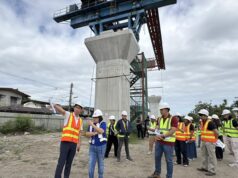In separate statements, the Kilusang Magbubukid ng Pilipinas (KMP) and the Pambansang Lakas ng Mamamalakaya ng Pilipinas (Pamalakaya) stressed the need for peace to pave the way for the uplift of Filipinos from poverty.
“The continuation of the peace negotiations is in the best interest of farmers who are pressing for genuine land reform, land distribution and real change under the Duterte administration,” KMP said.
This, even as Pamalakaya noted that “poverty, landlessness, hunger, injustice and gross human rights violations among the marginalized sector are the compelling reasons why there is an urgent need to attain the just and lasting peace in the country.”
KMP chairman Joseph Canlas said “farmers want the peace negotiations to continue. We want the peace talks to help address the problem of land monopoly, landlessness of farmers, unemployment and to realize the equitable distribution of social wealth.”
“The peace negotiation is a separate and distinct track of struggle to press for signifi cant pro-people reforms. While the New People’s Army and President Duterte announced the termination of the unilateral interim ceasefi res, it should not hinder the continuation of the talks that is gaining relevant developments with regard to discussions on the Comprehensive Agreement on Social and Economic Reforms (CASER) particularly agrarian reform and rural development,” Canlas said.
He cited an “outcome of third round of the peace talks in Rome that the government, in principle, acquiesced to free land distribution to farmers and farm workers. That alone, is a milestone with regard to pushing for socio-economic reforms and enough grounds to continue the talks.”
For his part, KMP Southern Mindanao leader Pedro Arnado said that “for us farmers, a just peace means food for our families, education for our children and recognition of our right to the land we till.”
“We call for the continuation of the peace talks and compliance to the Comprehensive Agreement on Respect for Human Rights and International Law (CAHRIHL) to avoid rights violations of civilians,” said Arnado who also noted that at least 20 farmers and national minorities were killed during the ceasefire period.
“Historically, it is the peasant masses that have made the ultimate sacrifices to achieve peace. The cost of peace is too expensive, farmers have paid it with their lives,” Arnado added.
At the same time, Pamapalakaya chairman Fernando Hicap expressed disappointment over Pres. Duterte’s “arbitrary decision to end the ongoing peace negotiation with the NDFP which now tackles the Comprehensive Agreement on Socio-Economic Reforms (CASER).”
In a statement, Pamalakaya said “genuine peace could not be achieved within the negotiating table if the Philippine government will continue to obey the dictates of those anti-peace high ranking government officials and military generals who work hand in glove to sabotage the peace. Hence, true peace lies within the hands of the Filipino people through their struggle.”




